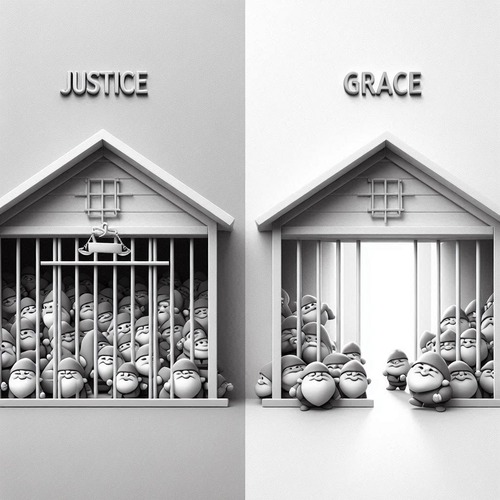Why Does God Show Grace to Some Sinners and Send Others to Hell?
Sure we know God is just and holy. We know, too, all of humanity has sinned and fallen short of God’s glorious standard. Given these truths, a perplexing question we can ponder over is this: Why does God show grace to some sinners and send others to hell? Shouldn’t He either punish every sinner or extend grace to all? Anything else appears either capricious or unfair. And yet, the Bible is clear some will inherit eternal life while others face everlasting hell.
Why does God show grace to some sinners and send others to hell?
The dilemma strikes at the very heart of how we understand God’s character and dealings with humanity. As we wrestle with this difficult question, here are some key considerations for us to mull over:
-
NO ONE RECEIVES INJUSTICE FROM GOD: After all, every one of us has sinned and deserves hell. Scripture is clear all have sinned and fallen short of God’s glory (Romans 3:23). The wages of sin is death (Romans 6:23), and the righteous judgment of God is to condemn sinners to eternal separation from Him in hell (Revelation 20:11-15). In this sense, if God were to send all of us to hell, He would be acting justly, as we have all earned that punishment through our rebellion against our holy Creator.
-
NONE OF US MERITS GRACE: Grace, by definition, is unmerited favour. In other words, if we merited it, it would not be grace. The late RC Sproul states it eloquently: “Grace, by definition, is something God is not required to grant. He owes a fallen world no mercy. If we cried out for justice at His hands, we could all receive the just condemnation we deserve. Justice is what we deserve. Grace is always and ever undeserved. If we deserved it, it would not be grace.”
-
SOME OF US DO RECEIVE GRACE: While all humanity stands condemned before a holy God, the amazing truth of the gospel is that God, in His infinite love and mercy, has chosen to extend the gift of salvation to some (Ephesians 2:8-9). This grace is not earned or deserved but is a free gift made possible through faith in the sacrificial death of Jesus Christ on the cross (Romans 5:8).
-
GOD CAN BE JUST AND STILL NOT SHOW GRACE TO EVERYONE: As Sproul highlighted, there is no injustice in God granting mercy to some while allowing others to receive the just consequences of their sin. If God chooses to pardon one guilty person, it does not make those He does not pardon any less guilty or deserving of condemnation. God is not obligated to extend grace to all; rather, the wonder is He extends grace to anyone at all.
So, why does God show grace to some sinners and send others to hell? Paul directly anticipates this question in Romans 9:14-15, asking “What shall we say then? There is no injustice with God, is there? May it never be! For He says to Moses, ‘I will have mercy on whom I have mercy, and I will have compassion on whom I have compassion.'” Paul is making it clear there is no injustice with God in showing mercy to some and not others, because no one deserves or has a claim on God’s grace and compassion in the first place. God is completely just in extending undeserved grace to some while allowing others to receive their justly deserved condemnation.
The beauty of grace is it is freely given—not to those who are owed it, but to those who are not. In extending grace to some, God’s justice toward others is in no way diminished. May we never lose sight of the profound reality we all deserve condemnation. And any salvation we receive is an undeserved gift from a loving and merciful God.
Related Reads:
Editor's Pick

From Empty to Overflow: The Abundant Life Jesus Promised
(AND WHY YOU SHOULDN’T SETTLE FOR LESS) We're surviving, but are we thriving? If we're honest, there's a gap between [...]

What Does Jesus Save Us From?
THREE BIBLE TRUTHS ABOUT SALVATION "Jesus saves." We’ve seen it on bumper stickers, heard it shouted at sporting events, maybe [...]

If God Wants Everyone Saved, Why Aren’t They?
THE REFORMED VIEW ON GOD’S DESIRE VS HIS DECREE The question haunts every believer who has lost an unbelieving loved [...]

The One Man Mystery in Acts 17:26: Is It Adam Or Noah?
When the Apostle Paul stood before the philosophers at Mars Hill, he delivered an insightful statement about human unity: “And [...]

Megiddo Or Jerusalem: Where Did King Josiah Die?
Recent archaeological discoveries at Tel Megiddo continue to reveal evidence of Egyptian military presence during the late 7th century BC, [...]

Losing Your Life Vs Wasting It: How Are the Two Different?
AND WHY DID JESUS PRAISE THE FORMER? Jesus spoke one of the most perplexing statements in Scripture: “For whoever wants [...]

Can Christians Be Demon Possessed? What the Bible Teaches
Perhaps you’ve witnessed disturbing behavior in a professing Christian, or you’ve struggled with persistent sin and wondered if something darker [...]

Sacred Fury: What Christ’s Temple Cleansing Truly Means
Mark 11 records the crack of a handmade whip that echoed through the temple corridors. Tables crashed to the ground, [...]

Did Jesus Cleanse the Temple Twice?
OR DID JOHN DISAGREE WITH THE SYNOPTICS ON TIMING? One of sceptics’ favourite "gotcha" questions targets what they see as [...]

Self-Authentication: Why Scripture Doesn’t Need External Validation
"How can the Bible prove itself? Isn't that circular reasoning?" This objection echoes through university classrooms, coffee shop discussions, and [...]
SUPPORT US:
Feel the Holy Spirit's gentle nudge to partner with us?
Donate Online:
Account Name: TRUTHS TO DIE FOR FOUNDATION
Account Number: 10243565459
Bank IFSC: IDFB0043391
Bank Name: IDFC FIRST BANK






